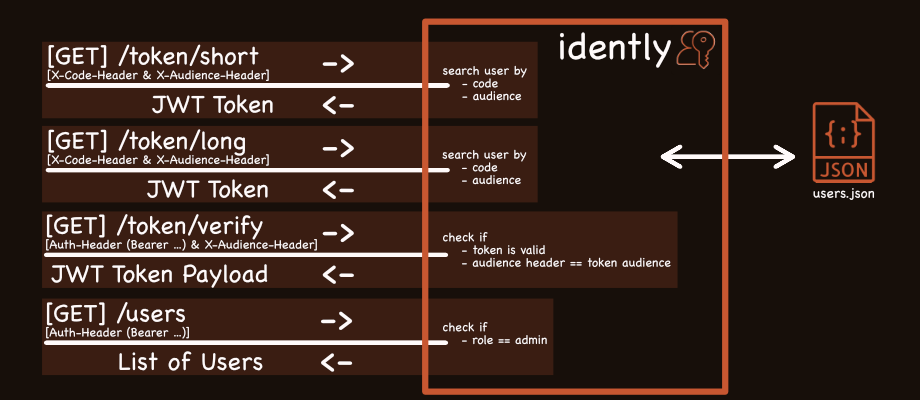Ever find yourself needing to protect a small internal tool, an admin panel, or a simple API? You reach for authentication solutions, and suddenly you’re wrestling with OAuth flows, complex SDKs, or heavyweight identity providers. It often feels like bringing a bazooka to a knife fight. I’ve been there, and that frustration is exactly why idently was born.
At its heart, idently is my take on dead-simple, stateless authentication
built with Deno. The core idea? Forget emails and passwords. Just give users a
secret code. They send the code, they get a JSON Web Token (JWT) back. Simple.
User data lives in a straightforward dummy.json file - easy to manage, easy to
understand.
From Basic Need to Added Flexibility
Initially, idently focused purely on that core loop: code in, JWT out. But
as with any tool you start using, refinements become obvious. First, sending the
secret code directly in the request body felt a little… exposed. While HTTPS
encrypts the traffic, moving the code to a custom header (Security-Code by
default) felt like better hygiene. A small change, but a step in the right
direction.
Then came the token lifetimes. Sometimes you need a token that expires quickly
(like 3 minutes for a quick action), other times you need something
longer-lasting (maybe 5 hours for a work session). So, idently gained two
distinct endpoints: /token/short and /token/long, each issuing a JWT with a
configurable expiry time set via environment variables
(TOKEN_SHORT_EXPIRES_IN_S, TOKEN_LONG_EXPIRES_IN_S).
Adding a Layer of Control: Audience Checks
The latest evolution addresses a common scenario: what if you have multiple applications using idently, but you want to ensure a token generated for accessing the ‘AdminPanel’ can’t be used to hit the ‘ReportingAPI’?
You create a file for each client you have and set a clientName in the file.
Now, when requesting a token via /token/short or /token/long, the client must
also send an Source specifying which application (source = ‘audience’) the
token is intended for.
// Example dummy.json file
{
"clientName": "dummy",
"users": [
{
"code": "supersecretcode123",
"systemRole": "admin",
"claims": {
"firstName": "John",
"lastName": "Stone",
"availableSince": "2025-04-02",
"customProperty": 4711
}
}
]
}idently checks if there is a JSON file for the requested source in the
header. If it’s not a match, no token is issued. Furthermore, the /token/verify
endpoint now also requires the Source header to ensure the token being
verified was actually intended for that specific application. It adds a simple
but effective layer of authorization on top of the authentication.
Tailoring Your Tokens: Custom Attributes and Claims
Beyond basic identification and audience, often your applications need a bit
more user-specific context directly within the JWT payload. Maybe it’s a
specific role within an app, a user ID from another system, or even a budget
limit.
idently makes this easy. You can just extend the claims section in the
JSON for each user. For example, you might add specificRole or budget or
just something else.
Still Simple at Heart
Despite these additions, idently remains true to its core philosophy. It’s
still stateless, configured primarily via environment variables, runs in a
minimal Docker container (~50MB), and leverages the power and simplicity of
Deno. Getting started locally is as easy as cloning the repo, copying
.env.example to .env, tweaking your settings, and running deno task start. An
example Kubernetes deployment file is also included.
Is idently for You?
If you need robust, enterprise-grade authentication with complex user management, idently isn’t the right fit. But if you’re looking for a no-fuss, code-based authentication layer for your internal tools or simple APIs, and appreciate the elegance of Deno, give idently a look.
Check out the project on GitHub: GitHub repository

